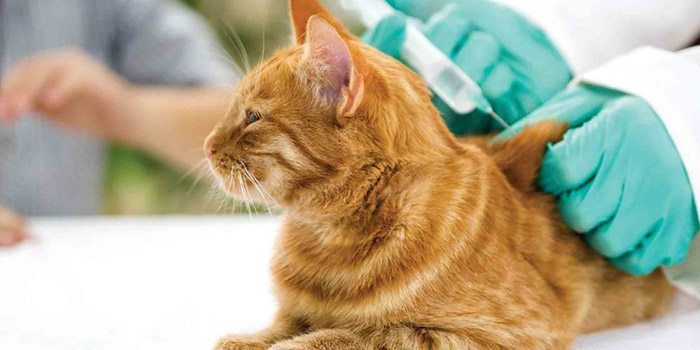

Modern medicine is simply amazing. We are able to treat and prevent more diseases and illnesses than ever before, and veterinary medicine is not exempt from these incredible advances. One of the most powerful tools we have at our disposal is vaccination. Thanks to this technology, our feline friends are living longer and healthier lives!
Learn all about cat vaccines and what your purring pal needs to stay healthy.
Core Cat Vaccines
There are some cat vaccines that are just not optional. Except for a few exceptions, all cats need to be vaccinated against some common diseases that are serious and/or highly contagious. Recommended core vaccines include:
Rabies – Rabies is not a common diagnosis amongst pets, but is a highly fatal disease that is a risk for people too. Montgomery County mandates that all cats over 12 weeks of age be vaccinated against rabies.
Panleukopenia – This viral disease, also known as feline distemper, can cause gastrointestinal distress and bone marrow suppression, and is nearly always fatal. Kittens are at particularly high risk.
Herpesvirus – Feline herpesvirus can cause upper respiratory symptoms, ocular ulcers, and conjunctivitis. It is particularly devastating for young cats, but the body’s inability to clear the virus can result in lifelong trouble for infected cats.
Calicivirus – This highly contagious virus causes upper respiratory problems and may lead to painful oral ulcers.
Typically, vaccination against panleukopenia, herpesvirus, and calicivirus is administered in a combination “distemper” (FVRCP) vaccine. Once your pet has been fully vaccinated, your veterinarian may recommend a longer vaccination interval, depending on several factors.
Extra, Extra!
Beyond these standard vaccinations, there are other vaccines that most cats benefit from receiving. The most notable of these is a vaccination against feline leukemia (FeLV). FeLV is now considered a core vaccine now by the Association of Feline Practitioners for initial vaccines and, only if the risk is low, can that vaccine be left for later at adult boosters since the cat will have some memory immunity from the initial series. We follow the AFP guidelines for feline vaccination protocols and include FELV as a core vaccination.
Feline leukemia is a top cause of feline deaths each year. It is contracted when cats are exposed to the saliva or blood of an infected cat. Kittens may also be infected during gestation, if their mother is FeLV-positive.
When a cat is exposed to FeLV, the body may be able to clear the infection. Some cats, however, cannot fight off the disease and the virus makes its way into the bone marrow and other tissues. It may remain hidden for some time, but it will eventually cause problems, including changes in the bone marrow or lymphoma (cancer).
Vaccination against FeLV is very effective and is recommended annually for all cats who have exposure to other cats. It is also recommended for kittens, as the immune system is not typically strong enough to fight off infection if exposed.
A Note About Feline Leukemia and FIV
Cats who are frequently exposed to other cats are at high risk for the retroviral infections caused by feline leukemia and FIV. Vaccination against FeLV is important, but limiting risk as much as possible can also help to prevent both of these diseases. It is recommended to:
- Keep cats indoors
- Vaccinate at-risk cats against feline leukemia annually
- Test any new cats before introducing them into your furry family
- Test at-risk cats frequently for FeLV and FIV
- Spay or neuter cats to limit bite risk that is common during mating/territorial fighting
A little common sense and a good vaccination protocol can go a long way towards protecting our feline companions. Cat vaccines are essential for keeping our pets happy and healthy, and Pets in Stitches is here to help. Join us every Tuesday & Wednesday from 3-4pm for our Walk-In Wellness clinic to stay updated on feline vaccinations!
